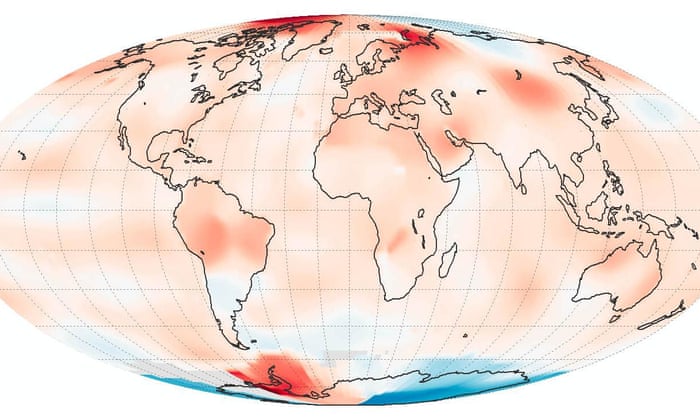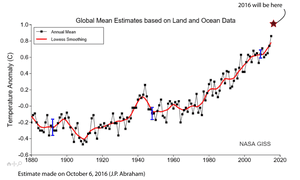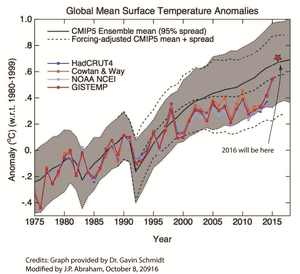Global warming continues; 2016 will be the hottest year ever recorded

July 2016 was the hottest month every recorded according to a monthly analysis of global temperatures by scientists at NASA’s Goddard Institute for Space Studies (GISS). Photograph: GISS/NASA
We know the world is warming – no factor can explain it aside from human emissions of greenhouse gases. Despite this, people who deny the basic facts of climate change have tried to argue that the Earth is either not warming or is only slowly heating. Well that just isn’t true anymore. The last three years are the nail in the coffin of the deniers of climate change. We have enough data this year to call 2016 as the hottest year ever record – and we have three more months left to go.
So, just how hot is 2016? Well my early predictions are shown in the graph below. I have taken temperature data from NASA and superimposed my predictions for 2016 – it isn’t even close. And by the way, it doesn’t matter whose data you use (NASA, NOAA, JMA, Hadley Centre) the results are the same. 2016 is going to blow 2015 out of the water.
A few things to note. First, these temperatures are surface temperatures that are taken across the globe. But, you can measure temperatures elsewhere and see the same result. Most importantly, measurements in the oceans, where 93% of the extra heat is stored are the best proof of global warming. I recently coauthored an open-access paper on this very topic which interested readers can get here.
You can measure sea level rise as the heated water expands, you can measure ice loss across the globe, you can measure temperatures in the lower part of the atmosphere. It doesn’t matter where; the story is the same.
What is the big deal? Well first of all, 2016 blows away 2015 which was previously the hottest year ever and that had beaten 2014 as the hottest year ever – call this a three-peat. Three records in a row and the last two are by large margins. Does this mean global warming all of a sudden has gotten worse?
No, surface temperatures fluctuate a lot – you can see that in the figure. Temperatures will go up or down from year to year without apparent reason. This is why we are interested in the long term trends. This is also why we are interested in looking at other measures of warming (especially in the oceans). All of our measurements agree with each other – we know the Earth was warming long before this set of records began falling in 2014.
One thing these temperatures can do is enable us to compare computer models with measurements. We’ve seen that models have done an excellent job of correctly predicting the rate of heating of the Earth. My own research shows that in the oceans, the models are slightly under-predicting the rate of heating.
To compare models and measurements at the Earth’s surface, I’ve borrowed a figure from Dr. Gavin Schmidt of Nasa and I’ve overlaid the 2016 surface temperatures. A star shows where 2016 will be. The star should be compared to the three heavy dashed lines in the figure. The upper and lower dashed lines show the uncertainty in the models and the middle dashed line shows the average.
Is the 2016 data within the upper and lower lines? Yes it is.
Is the 2016 data close to the middle dashed line? Yes again. In fact, the 2016 temperatures are above the average which means the models under-predicted the temperature of 2016.
Before we get too anxious, it is almost certain that 2017 will be cooler than 2016. In fact, we may not set another record for a few years. But just as a few hot years doesn’t prove global warming, a few cooler years wont disprove it. The long-term trend is clearer upwards through and the models are spot on.
All this aside, there are still things we can do to bend the arc of this curve. There are actions we can take as individuals and as collectives to reduce our emissions and our dependence on polluting fuels. That message is, and continues to be, the most important one.
But one thing we cannot do is deny facts.


Comments